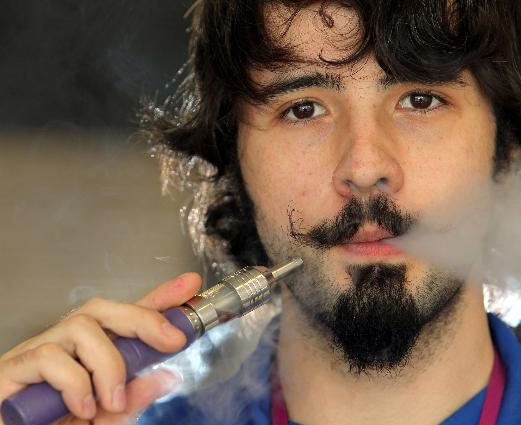Legislators aim to bar e-cigarette sales to minors
By Chris Bergeron/Daily News staff
NATICK — Appearing on the Late Show, sassy actress Katherine Heigl puffed an electronic cigarette as she told David Letterman it had helped her kick a smoking habit and live healthier since becoming a mother.
Rather than applauding, Tami Gouveia, executive director of Tobacco Free Mass, is cheering a new bill to prohibit sale of e-cigarettes and other “nicotine-delivery devices’’ to anyone under 18 in Massachusetts.
Gouveia supports the bill filed last week by Rep. Jeffrey Sanchez, D-Jamaica Plain, because she’s concerned such devices when glamorized by celebrities, like Jenny McCarthy and Johnny Depp, encourage minors to smoke.
“We regard them as an initiation pathway to using cigarettes. It’s dangerous to think of e-cigarettes as less dangerous than regular cigarettes. That’s what the industry wants us to think,’’ she said.
Sanchez’ bill “prohibits sale of nicotine delivery products … to anyone under 18″ and restricts retailers and manufacturers from providing samples of such products” except in tobacco stores and smoking bars.’’
Sanchez said he wrote his bill because current state laws “are silent on the availability of e-cigarettes to minors.’’
“Right now, my 7-year-old daughter could walk in and buy them at several locations and nobody would say anything. We want to make such products inaccessible to children. … We need to keep our children from becoming a new generation of nicotine addicts,’’ he said.
E-cigarettes and related products are currently sold under the name Smoke To Live: The Electronic Cigarette from a kiosk in the Natick Mall and can be purchased at several area tobacconists, package stores and from on-line sites.
Dvora Lieberman, regional manager for Smoke To Live, which operates in Massachusetts and three other states, said company policy prohibits sales to anyone under 18.
“If someone looks underage, we instruct our vendors to ask for IDs,’’ she said in a telephone interview. “If you’re going smoke cigarettes, e-cigarettes are better but they’re still addictive. It’s still a stimulant.’’
Lieberman said e-cigarettes can “definitely’’ help smokers quit traditional cigarettes which have many more harmful chemicals and they also provide “the option of reducing nicotine all the way down to zero if you want to quit.’’
She said e-cigarettes are also less harmful because they don’t burn and damage skin tissue and reduce the unpleasant tastes, smells and coughing associated with conventional cigarettes.
Speaking from her Framingham office, Gouveia expressed support for Sanchez’ bill’s prohibition of using e-cigarettes in places where smoking is outlawed, such as the workplace and high school campuses.
Several MetroWest legislators expressed support for the bill, citing the importance of discouraging nicotine use among minors.
After speaking with Sanchez, Sen. Karen Spilka, D-Ashland, described the bill as a “commonsense’’ measure to protect minors’ health.
“It’s important not to get these devices into children’s hands. Kids could think they’re better than cigarettes. The bottom line is nicotine is a poison that causes cancer,’’ she said.
While nicotine delivery devices are often marketed as safer alternatives to smoking, Spilka said further research is necessary to determine their impact on users’ health and the chemical composition of the “vapors’’ they release.
“We need to be wary and understand the consequences of these devices,’’ she said.
State Rep. Chris Walsh, D-Framingham, said the bill’s premise of keeping such devices out of minors’ hands makes good sense.
He said he was troubled by an advertising slogan for a brand of e-cigarettes that promised to help users “re-gain your freedom from smoking.’’
“Since nicotine is a habit-forming drug, promoting it by saying it’ll help get you off nicotine seems disingenuous,’’ said Walsh.
Walsh said, however, he wants to learn more about what carcinogens are delivered through such devices.
Two other area state representatives, Carolyn C. Dykema and Alice Hanlon Peisch, expressed support for Sanchez’ bill.
Dykema, D-Holliston, said she’d “just signed on to co-sponsor’’ Sanchez’s bill because of concerns nicotine delivery devices could be used to consume other illegal drugs including marijuana and some opioids including heroin.
She said she’s looking forward to a public hearing because research about the advertised benefits of such devices is “inconclusive.’’
Peisch, D-Wellesley, said she’d likely support efforts to restrict minors’ access to such devices and their use on school grounds. While Sanchez’ bill doesn’t recommend taxing such devices like conventional tobacco products, she said additional costs could further discourage minors from purchasing them.
Senator Richard T. Moore, D-Uxbridge, cited an American Cancer Society study that said e-cigarettes might encourage people to smoke and added “more research is needed to see if the tobacco tax should be broadened to include electronic cigarettes.’’
And Sheriff Peter Koutoujian called “banning electronic cigarettes for children under 18 the right thing to do.’’
“Electronic cigarettes glamorize an unhealthy and addictive habit, not to mention that these are actual nicotine delivery devices,’’ he said. “That’s pretty much a one-two punch for children, setting them up to think smoking is cool then working in a chemical dependence. … Electronic cigarettes pose one more temptation for the younger teenagers that we don’t need out there.”
http://www.metrowestdailynews.com/features/x606655175/Legislators-aim-to-bar-e-cigarette-sales-to-minors?zc_p=1


